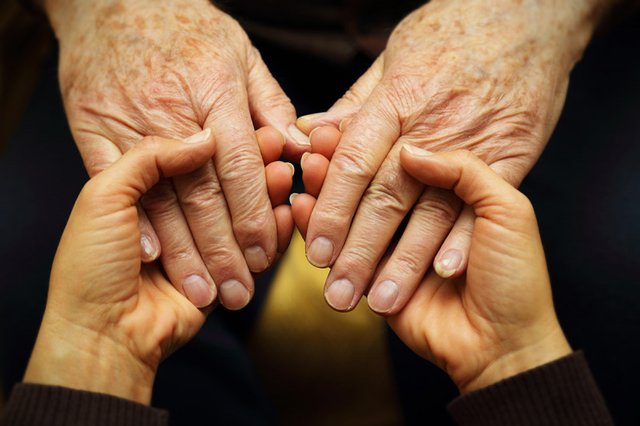The Future of Healthcare: Person-Centered Care

Mr. Jones is being wheeled into a nursing home in the middle of night after finally getting the okay from the insurance companies and doctors to transfer into long term care. Mr. Jones was admitted to the facility due to his stroke a few weeks prior and had rehabilitated fairly well for his serious condition. His nervous family walks him in, gets him settled in a room, and answers a few brief previous history questions for the nurses on call. In the following weeks, Mr. Jones had difficulty sleeping at night. During the day, he would sleep, miss meals, and not participate in group activities. Worried about possible decline, he was prescribed some medication to help him sleep. He soon developed a UTI for which he was prescribed an antibiotic. However, this did not improve Mr. Jones' adjustment to long term care. He was exhibiting signs of depression...for which he was prescribed an antidepressant. After about 6 weeks in the nursing home, Mr. Jones fell out of his bed in the middle of the night after trying to get up and getting dizzy. His family was called in and the medical professionals gathered to do a root analysis of possible environmental causes for Mr. Jones' fall. With the meeting going nowhere as to why Mr. Jones declined so quickly, they decided to do a more in depth history of Mr. Jones...only to find out that Mr. Jones had been a firefighter on the night shift for 56 years and had not slept during the night for as long as they could remember.
Had the medical professionals thought to learn more about Mr. Jones, they would not have been alarmed by his sleeping habits , would not have further broke his routine and caused his depression, would not have prescribed medication upon medication, and consequently would have prevented a potentially life threatening fall.
Unfortunately, this is an incredibly oversimplified example of our healthcare system today. More often than not, healthcare is not motivated toward the quality of life for the individual. It is not the rooted in the autonomy of the individual, but the efficiency and productivity of the system. This issue is increasingly prevalent in care for older adults. In nursing homes and assisted living facilities, daily meals, showers, social activities, and sleep are scheduled regardless of personal preferences. And medical professionals just can't seem to find the time to care about individual patients. As hospital care is becoming more expensive and nurses becoming more qualified to give advanced care, hospitals are pushing patients out more rapidly into nursing homes than ever. The rooms are filled, resources are low, and suddenly a nursing "home" becomes a long term hospital. And we wonder why pharmaceutical companies selling antidepressants are making so much money.

However, there is light at the end of the tunnel. Person-centered care (formerly client-centered) is a spin-off of Carl Roger's Humanistic Approach to psychotherapy. It emphasizes autonomy and a holistic approach to the human person, encompassing mind, body, and spirit as interdependent parts of well-being. The focus of healthcare is not curative, but rather about developing a relationship. It means getting to know the individual that is being cared for: their wants, needs, past, and present. Many times it takes the form of "the customer is always right" mentality (except labels such as customer or patient would never be used).
The job of the caregiver is not only care, but also affirmation of the person being cared for. Unwanted or difficult behaviors are not solved by medications but through fulfilling the needs that are indirectly expressed through such behaviors. The facility should meet the needs for physical, psychological, and spiritual well-being , providing holistic, preventative, and curative care.

Clearly there's quite a bit of idealism involved in this theory because healthcare depends on efficiency, standardization, and proper allocation of resources. So I don't think that i could ever support person-centered care as some sort of healthcare reform plan. In reality, person centered care isn't a set of procedures, but a mindset. A systematic training of person-centered care would provide a more efficient implementation. Person-centered care as shown to be successful in improving individual well-being and improve nurse satisfaction. A brief example:
My college is affiliated with a religious order of sisters who live and receive care on campus. A few years back (I'm unsure of exactly when), the group implemented person-centered care in a separate facility that only housed 10 sisters with Alzheimer's and Related Dementia. The facility was specifically planned to model a real home, with many windows. There was a focus on social interaction, with couches and chairs facing each other rather than in a line facing the window. Doors within the facility between hallways were not locked. The residents decided when they would shower, eat, sleep, etc. Many of them were given jobs to do in the kitchen, chapel, or even filing. The jobs were minimal and not very helpful, but it gave the resident's purpose. Residents were able to choose their activites such as painting, reading, bingo, etc. Nurses and caregivers were given proper instruction and training on how to treat and interact with the residents in light of their disease. Trust, affirmation, and listening were core to interactions.
So, what did they see? I'll tell you what they didn't see. They didn't see "unwanted behaviors" such as agitation or noncooperation. They didn't see residents catatonically staring out the windows and avoiding social situations. What they did see was improvement. Needs were met and medications were decreased. And, surprising, staff satisfaction also enhanced. Maybe not all the physical improvements, but the residents were functioning, satisfied and dare I say... happy?

Person-centered care has a wealth of applications, and I think it gives us a lot of room to grow in how we approach healthcare. Especially healthcare for older adults amidst the worldwide aging population.
I've gotten this general knowledge from three years of classes so I can't really cite anything. But I will provide some helpful sources if this is of interest to you.
http://www.livingdementia.com/downloads/docs/person-centered_dementia_care.pdf
Alive Inside is a great documentary related to this theory
and, if you're interested in an amazing movie indirectly related, K-PAX is just for you.